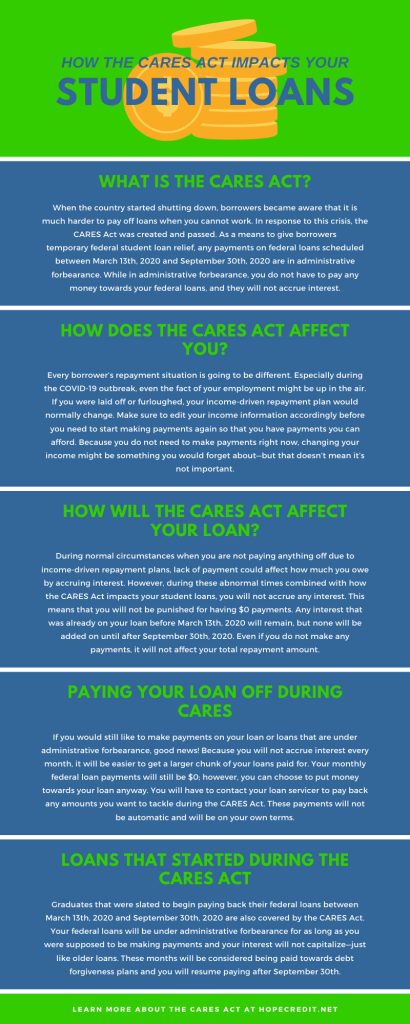You may be pinching pennies during the COVID-19 crisis, and understanding how the CARES Act impacts your student loans could ease your financial burden. Federal student loan payments might not be top of mind—but thanks to recent legislation, you may qualify for payment relief and interest suspension. Graduates across the country are facing job loss and uncertainty, which makes student loan support more critical than ever.
On March 27th, the government enacted the CARES Act, offering financial relief. While self-isolating or managing changing employment, now is the perfect time to learn what this means for your student debt.
What Is the CARES Act?
The CARES Act, also known as the Coronavirus Aid, Relief, and Economic Security Act, was passed to support Americans impacted by the pandemic. One major benefit is student loan forbearance.
From March 13th, 2020, through September 30th, 2020, eligible federal student loans are placed in administrative forbearance—meaning you’re not required to make payments, and no interest will accrue.
CARES Act and Student Loan Relief
However, the CARES Act student loan relief only applies to federally held loans. Private loans and school-issued loans are not included. Visit the Federal Student Aid website to verify if your loans are covered. Also, explore your state’s COVID-19 relief measures for additional financial help.
How Does the CARES Act Affect You?
Each borrower’s repayment situation is different. If you’ve lost income or were furloughed, consider updating your income information for income-driven repayment plans. Doing this ensures your post-CARES payments remain affordable.
If your loan recertification date fell within the relief period, it has been delayed by six months, and you’ll be notified when it resumes.
Even if you’re employed or working from home, your loans are still in administrative forbearance. How the CARES Act impacts your student loans varies, but it offers advantages no matter your current status.
How the CARES Act Affects Your Loan
Under normal conditions, paused payments would lead to accumulating interest. But not now. During this federal student loan forbearance period, no new interest will accrue. Any interest from before March 13th, 2020, stays the same, and payments made during this time go directly toward your principal.
These non-payments also count toward loan forgiveness, if you’re on an income-driven plan. That means you’re not missing progress toward debt forgiveness—even with $0 payments.
Paying Your Loan Off During CARES
If you choose to pay your student loan now, you can reduce your principal faster because interest is not accruing. Contact your loan servicer directly to make voluntary payments—they won’t be automatic.
If you want to opt-out of forbearance entirely and resume regular billing, you’ll need to request that specifically. Otherwise, you can make optional payments while still in forbearance.
New Federal Loans Under the CARES Act
Recent graduates with federal loans that began between March 13th and September 30th are also covered. These loans qualify for the same forbearance and interest suspension, and the months still count toward repayment and forgiveness timelines.
Loans Not Covered by CARES
Unfortunately, private student loans are not included in CARES Act relief. If your loan is private or commercially owned, seek support through your lender or explore refinancing.
Some states offer relief for private borrowers. Check your state or city websites for any temporary protections or payment deferral programs.
If you’re struggling, consider working with organizations like Hope Credit to explore refinancing or consolidation options tailored for your situation.
Stay Informed About Your Student Loans
Stay updated as the government may issue further COVID-19 relief or student loan policy changes. For now, expect your payments to resume after September 30th, 2020. Keep an eye on official news sources and review your account with your loan servicer regularly.

